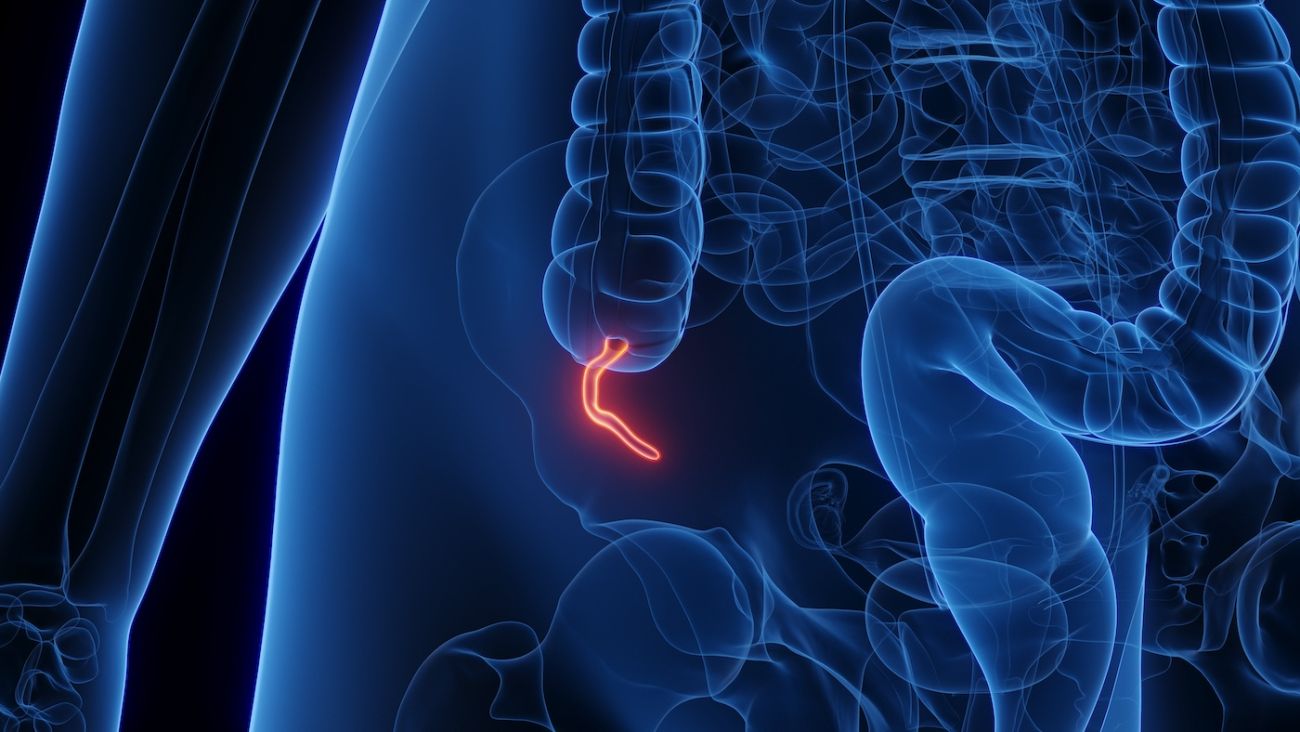You can! In the world of body parts, the appendix is a curious outlier. It’s basically a small pouch of tissue attached to the large intestine, but with an unknown function. When it becomes inflamed and infected — the condition known as appendicitis — surgery to remove the pouch is a speedy, forever cure.
That’s probably why it seems odd that cancer would even occur in a body part with no known benefit. Cancer of the appendix, or appendiceal cancer, is very rare, but it is concerning because it can also spread, often without any symptoms. While about five to nine of every 100 people develop appendicitis at some point, according to the National Institutes of Health, only about one to two people out of a million develop appendiceal cancer.
Interestingly, however, it’s during surgery for appendicitis that appendiceal cancer is usually discovered. Sometimes it’s detected by chance when an imaging scan is performed for another reason. Because appendiceal cancer is so rare, it’s especially important to seek treatment from a comprehensive cancer center, says Zachary Stiles, DO, surgical oncologist at Roswell Park Comprehensive Cancer Center.
What is appendiceal cancer?
There are two main types of appendiceal cancer: epithelial appendiceal cancer and neuroendocrine appendiceal cancer. Epithelial appendiceal cancer, or adenocarcinoma, starts growing in the inner lining of the appendix. Neuroendocrine appendiceal cancer arises from enterochromaffin cells (or Kulchitshy cells) which are specialized cells that make chemicals important for digestion and movement of the intestines. These two types of appendiceal cancer are most common and make up about 80% of all appendiceal tumors.
Another tumor type, called low-grade appendiceal mucinous neoplasm (LAMN), also can occur in the appendix. “While these are not cancer per se, they don’t have the ability to spread through the body, but they can spread in the abdominal cavity,” explains Dr. Stiles. The danger in having cancer in a seemingly unnecessary appendage is that it can spread to other parts of the abdomen, most often if the appendix ruptures. It can also spread to lymph nodes and the rest of the body, though rarely.
What are the symptoms of cancer of the appendix?
Because most cases don’t seem to produce any warning signs, many people are diagnosed only after the appendix is removed because of appendicitis. “Symptoms can be really subtle, and sometimes there aren’t any warning signs,” says Dr. Stiles. “It can come up incidentally, with no idea it’s there. If a tumor is bigger or more advanced, there can be some symptoms.” These can include:
- Right-sided abdominal pain, similar to appendicitis
- Other abdominal or belly pain
- Feeling bloated
- Nausea and vomiting
- Feeling full after starting to eat
- Unexplained weight loss or weight gain
For those with symptoms, a physician will take a CT or MRI scan to image the appendix. If a tumor is discovered, the surgeon will take a small sample from the tumor with a needle for a biopsy. This may be done surgically, or sometimes at the time of colonoscopy.
You have time for a second opinion
It’s important to seek a second opinion before treatment begins to ensure your diagnosis is correct and your treatment options are appropriate.
How is appendix cancer treated?
Surgery to remove a cancerous appendix and other nearby affected tissue is usually the preferred treatment, Dr. Stiles says. Roswell Park is among only a handful of cancer centers that offer a special surgical procedure for rare or advanced cancers, called cytoreductive surgery with hyperthermic intraperitoneal chemoperfusion, or HIPEC. The treatment involves surgery to remove the cancer, then delivering heated chemotherapy directly to the abdomen before the operation is completed. “First, we take out all the visible cancer. Then, using a special profusion device, we put catheters into the abdominal cavity and circulate the heated solution throughout the cavity for about 90 minutes,” Dr. Stiles explains. “This is to treat any microscopic cancer cells living on surfaces of the cavity or the intestines.” The treatment is also used for other abdominal cancers and mesothelioma.
"Appendiceal cancer tumors are the poster child for this type of treatment and show the most benefit,” says Dr. Stiles. “Most of these tumors spread locally, not distantly, so traditional chemotherapy doesn’t work because it doesn’t penetrate the abdomen.”
This is a one-time treatment, explains Dr. Stiles, so the typical issues with chemotherapy given over weeks or months are avoided. Patients typically stay in the hospital for five to seven days — like any large abdominal surgery. Full recovery takes about a month, though patients can usually resume normal activities and return to work in two to four weeks.
This cancer can recur but continues to be treatable if it does. “Unlike other cancers that may spread throughout the body and are hard to deal with, appendiceal cancer typically comes back locally. We can even repeat CRS/HIPEC treatment years down the line in select cases," says Dr. Stiles.
Roswell Park has been treating patients with HIPEC since 2002 and has well-established procedures for successful care by the entire surgical and recovery teams. For that reason, “It’s of paramount importance that people are evaluated in a comprehensive cancer center like Roswell Park,” Dr. Stiles says. “Because this cancer is so rare and only a handful of centers in the country are doing this procedure, patients have the benefit of the expertise of our entire team for these specialized procedures.”



